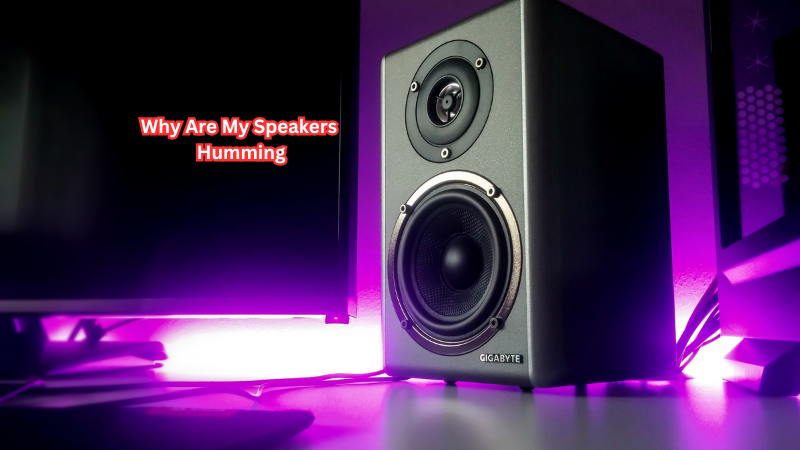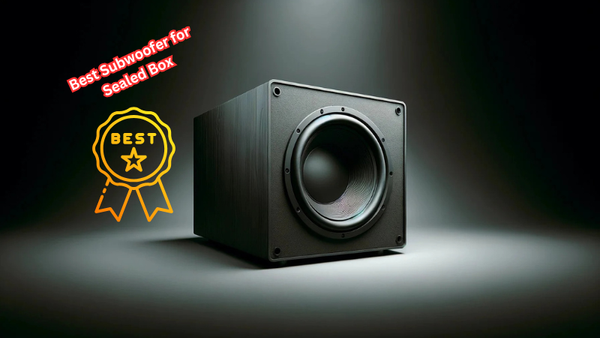Speakers are an essential part of any audio system as they convert electrical signals into sound waves we hear. However, sometimes speakers start humming or producing a low-frequency noise that can ruin the listening experience.
This issue is annoying and common and can occur in both new and old speakers. Many factors can contribute to this problem, ranging from ground loops and faulty wiring to electromagnetic interference and poor placement.
In this guide, we will delve deeper into why speakers hum, how to troubleshoot the issue, and what preventive measures you can take to ensure your sound system remains humming-free.
What Is Speaker Humming
Speaker humming is an audible low-frequency noise that occurs when the audio system is turned on, even when no sound is being played. It can range from a slight buzz to a loud hum and can be heard in one or both speakers.
The most common cause of speaker humming is a ground loop, which happens when multiple devices are connected to different power sources, causing a difference in electrical potential. This creates an unwanted current flow through the audio system, resulting in low-frequency noise or hum.
Electromagnetic interference caused by other electronic devices nearby, such as routers and cell phones, can also cause speaker humming. Faulty wiring or damaged cables may also contribute to this issue.
Reasons Why Speakers Humming
As mentioned earlier, there can be various reasons why your speakers are humming. Let's take a closer look at some of the most common causes:
Ground Loops and How to Fix Them
Ground loops occur when your audio equipment is connected to multiple outlets, leading to different electrical potentials. This difference creates a looped path for unwanted current, causing the speaker to hum. To solve this, first, ensure all interconnected devices use a common power source.
Try plugging them into a single power strip with surge protection. Alternatively, an isolating transformer or a ground loop isolator can break the loop without affecting audio quality. Check all connections, replacing any faulty cables that might exacerbate the issue. Ensuring your equipment is properly grounded helps prevent ground loops and reduces interference in your audio system.
Electromagnetic Interference and How to Minimize It
Electromagnetic interference (EMI) occurs when electronic devices emit signals that disrupt your audio equipment. To minimize EMI, ensure your speakers and audio equipment are distanced from devices like Wi-Fi routers, cell phones, and microwaves.
Use shielded cables to protect against external signals, and replace any damaged ones. Position the cables carefully, avoiding loops or coils that can enhance interference.
If possible, use balanced audio connections, which reject common-mode noise, offering better protection against EMI. Keeping your audio system in a well-ventilated area can also reduce interference, maintaining optimal performance without compromising sound quality.
Faulty Wiring or Cables
Faulty wiring or cables can significantly impact the quality of your audio system, leading to distorted sound, interruptions, or complete failure of the audio output.
Over time, wires can become frayed, corroded, or kinked, disrupting the signal flow. Poor-quality cables might also lack proper shielding, allowing interference from other electronic devices to affect the sound quality.
Regular inspection and maintenance of wiring can mitigate these issues. Ensure all connections are secure and consider upgrading to high-quality cables designed to resist wear and provide superior signal transmission for optimal audio experience.
Poor Placement of Speakers
The placement of speakers plays a crucial role in determining the quality of your audio experience. Poorly positioned speakers can result in uneven sound distribution, with some areas experiencing excessive volume while others receive little to no sound.
To achieve optimal sound quality, speakers should be placed at ear level and equidistant from the listener.
The room's acoustics, including furniture placement and materials, can also affect sound performance. Experimenting with speaker angles and distances, along with using stands or mounts, can help achieve a balanced and immersive audio environment.
Defective Amplifiers or Speakers
Defective amplifiers or speakers can severely compromise the performance of an audio system, resulting in poor sound quality or a complete lack of sound.
Common issues with amplifiers include overheating, clipping, and power supply failures, which can lead to distorted audio output or damage to speakers. Speakers, on the other hand, might suffer from blown drivers, damaged cones, or faulty connections.
Regular maintenance, such as cleaning components and checking connections, can help prevent these issues. If defects persist, consulting with a professional technician for repair or replacement is advisable.
So these are some of the main reasons why speakers hum and how to troubleshoot them. By understanding these causes and taking preventive measures, you can ensure your audio system remains humming-free, providing an enjoyable listening experience for years to come.
Can A Hum-Free Sound System Be Achieved?
While it may seem like speaker humming is an inevitable issue, there are steps you can take to achieve a hum-free sound system.
Investing in high-quality audio equipment and keeping up with maintenance can significantly reduce the risk of speaker humming. Proper placement and grounding of speakers, along with minimizing electromagnetic interference, also play a vital role in achieving optimal audio performance.
Additionally, regularly checking for and addressing any potential causes of speaker humming can help prevent the issue from occurring in the first place. By taking these measures, you can maintain a humming-free sound system for better listening experiences.
Plus, with advancements in technology and the increasing availability of noise-canceling features in audio equipment, achieving a hum-free sound system is becoming more attainable. So don't let speaker humming disrupt your enjoyment of music or other audio content, take the necessary steps to keep your sound system humming-free.
What Are the Best Practices for Speaker Placement?
As mentioned earlier, the placement of speakers plays a significant role in sound quality. Here are some best practices to follow when positioning your speakers:
- Ensure the speakers are at ear level for an optimal listening experience.
- Place the speakers equidistant from each other and from any walls or corners to avoid uneven sound distribution.
- Avoid placing speakers too close to electronic devices that may cause interference.
- Experiment with different angles and distances to find the best placement for your specific room and audio equipment.
By following these best practices, you can achieve a well-balanced and immersive audio experience. A little bit of experimentation goes a long way in finding the perfect speaker placement for your setup.
How Can I Test My Audio Equipment for Issues?
Regularly testing your audio equipment can help identify any potential issues and prevent them from becoming bigger problems. Here are some ways to test your audio equipment:
- Use a tone generator to test the frequency response of your speakers.
- Use sound pressure level (SPL) meters to measure volume levels and ensure they are consistent across all speakers.
- Listen for any distortion or other abnormalities in the sound.
- Check connections and cables for any signs of wear or damage.
By performing these tests regularly, you can catch and address any issues before they affect your listening experience. Seeking professional assistance is also recommended if you suspect any significant faults with your audio equipment.
How Does Room Acoustics Affect Sound Quality?
Room acoustics play a crucial role in defining sound quality by influencing how sound waves travel and interact within a space. Hard surfaces like concrete or glass can cause sound to reflect excessively, leading to echoes and reverberations that distort audio clarity.
Conversely, soft furnishings, curtains, and carpets can absorb sound, reducing echoes and improving clarity.
The shape and size of a room also affect acoustics; larger rooms may cause sound to dissipate, while irregular shapes can create unpredictable reflections. Proper acoustic treatment, such as strategically placing absorbent panels or diffusers, can enhance sound quality by balancing reflections and absorption.
The room’s contents and their placement can further modify the acoustic environment, potentially either enhancing or hindering audio quality. Considering these factors when arranging your room or setting up a sound system can help in creating an immersive and clear listening experience.
Tips for Maintaining a Hum-Free Sound System
To maintain a hum-free sound system, here are some tips to keep in mind:
- Regularly clean and dust your audio equipment: Dust and debris can interfere with connections and cause electrical issues, leading to speaker humming. Plus, keeping your equipment clean can also extend its lifespan.
- Check connections regularly: Loose or faulty connections can cause the speaker to hum. Ensure all cables and wires are securely connected and replace any damaged ones. And don’t forget to check the connections between different audio components as well.
- Keep electrical devices away from speakers: As mentioned earlier, electromagnetic interference can cause speaker humming. Keep electronic devices, such as televisions or computers, at least a few feet away from speakers.
- Invest in quality equipment: Higher quality audio equipment is less prone to issues like overheating and power failures that can lead to speaker humming. While it may require a larger investment upfront, it can save you money and headaches in the long run.
By following these tips and regularly maintaining your sound system, you can enjoy a hum-free listening experience for years to come. Remember that prevention is key when it comes to avoiding speaker humming, so don’t neglect proper upkeep and care for your audio equipment.
FAQs
Are noise-cancelling features effective in eliminating speaker humming?
Yes, noise-cancelling features can be very effective in reducing and eliminating speaker humming. Noise-cancelling technology works by actively detecting and cancelling out unwanted external noises, such as buzzing or humming sounds.
Can speaker placement affect sound quality even with high-quality audio equipment?
Yes, the placement of speakers is crucial for achieving optimal sound quality, regardless of the equipment's quality. Even with top-of-the-line audio equipment, improper placement can lead to uneven sound distribution and potential issues like echoes or reverberations.
Is regular maintenance necessary for preventing speaker humming?
Yes, regular maintenance is essential for preventing speaker humming. Dust and debris build-up, loose connections, and other issues can cause humming over time if not addressed. Regular maintenance and upkeep can help catch these issues early on and prevent them from becoming more significant problems.
Conclusion
In conclusion, proper speaker placement and regular maintenance are crucial for achieving an immersive and clear audio experience.
Understanding the factors that affect sound quality, such as room acoustics, can also help in creating a suitable environment for optimal listening. By following best practices and taking preventative measures, you can enjoy high-quality sound without the interference of speaker humming.
So go ahead and experiment with your speaker placement, keep your equipment well-maintained, and sit back and enjoy your favorite tunes without any distractions. Happy listening!





